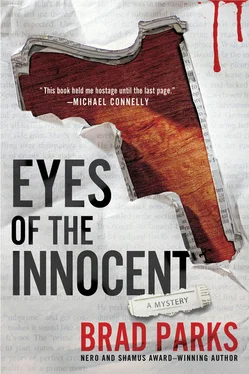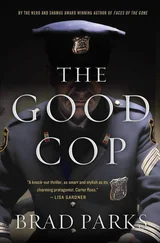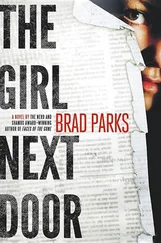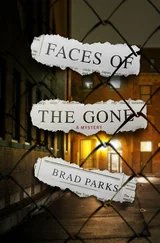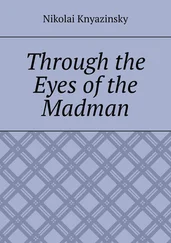Brad Parks - Eyes of the Innocent
Здесь есть возможность читать онлайн «Brad Parks - Eyes of the Innocent» весь текст электронной книги совершенно бесплатно (целиком полную версию без сокращений). В некоторых случаях можно слушать аудио, скачать через торрент в формате fb2 и присутствует краткое содержание. Год выпуска: 2011, ISBN: 2011, Издательство: Minotaur Books, Жанр: Триллер, на английском языке. Описание произведения, (предисловие) а так же отзывы посетителей доступны на портале библиотеки ЛибКат.
- Название:Eyes of the Innocent
- Автор:
- Издательство:Minotaur Books
- Жанр:
- Год:2011
- ISBN:0312574789
- Рейтинг книги:3 / 5. Голосов: 1
-
Избранное:Добавить в избранное
- Отзывы:
-
Ваша оценка:
- 60
- 1
- 2
- 3
- 4
- 5
Eyes of the Innocent: краткое содержание, описание и аннотация
Предлагаем к чтению аннотацию, описание, краткое содержание или предисловие (зависит от того, что написал сам автор книги «Eyes of the Innocent»). Если вы не нашли необходимую информацию о книге — напишите в комментариях, мы постараемся отыскать её.
Eyes of the Innocent — читать онлайн бесплатно полную книгу (весь текст) целиком
Ниже представлен текст книги, разбитый по страницам. Система сохранения места последней прочитанной страницы, позволяет с удобством читать онлайн бесплатно книгу «Eyes of the Innocent», без необходимости каждый раз заново искать на чём Вы остановились. Поставьте закладку, и сможете в любой момент перейти на страницу, на которой закончили чтение.
Интервал:
Закладка:
Brad Parks
Eyes of the Innocent
The electrician patted his breast pocket for the tenth time and, once again, exhaled noisily: the envelope-Primo’s envelope-was still there.
It was the weight of the thing that threw him. He thought $10,000 ought to have more heft to it. In his hometown of Belem, Brazil, $10,000 was a substantial sum, enough for a down payment on a house-a brick house in a decent neighborhood, not one of those shanties in the slums. There was a time when if you converted 10,000 American greenbacks into cruzeiros, you needed a wheelbarrow to haul it.
Here in the States, meted out in hundred-dollar bills, it could be bound in paper bands and slipped into an envelope. And it weighed, well, not enough to stop the electrician from constantly checking the pocket of his winter coat.
His errand was simple enough. Or at least it should have been. He picked up the money at Primo’s office, a small warehouse in a swampy section of Newark, New Jersey-the industrial part that runs alongside the New Jersey Turnpike. He dropped it off at a storefront office on Springfield Avenue, in the heart of the Central Ward. It was a route the electrician had come to know well.
He had done this, what, fifteen times? Twenty? He was starting to lose count. But every time, it made him feel as if he had scorpions in his underwear. It was only a matter of time until he got stung.
Cash. Why did it always have to be cash? And why did it have to be delivered personally? Why couldn’t Primo just write a check and slip it in the mail?
The electrician brought his hand to his pocket one last time. Still there. He parked his truck and braced himself for the worst part: the twenty feet from the curb to the storefront, where he had to wait to be buzzed in-all the while feeling as if that cash brick were a signal flare to every punk, thug, and stickup artist for five blocks.
He glanced around to see no one was coming, made his twenty-foot dash, then mashed the buzzer four times in rapid succession. After what seemed like forever but was really just ten seconds, the door buzzed open. Relieved, he burst through it. The scorpions had decided not to sting him. Not this time.
A thickset, round-shouldered black man looked up from behind his desk.
“Damn, boy, where the fire at?”
It had been the same man receiving the money every time, but they had never bothered with introductions or niceties. They were simply doing the bidding of their powerful bosses. Names didn’t matter. Banter accomplished nothing.
“Ten?” the man asked.
“Ten.”
The electrician handed the man a piece of paper. The man scowled.
“You Spanish guys got to learn to write English. The last letter on the last name … That a a or a o ?”
The electrician swallowed the insult. The name wasn’t his. And he didn’t bother to inform this ignoramus that the name was Portuguese, not Spanish, and that they used the same alphabet-which happened to be Roman.
“Ronaldo. With an o, ” he said.
The man scribbled for a few more seconds, then handed the electrician a receipt. N ot another word passed between them.
CHAPTER 1
I made at least four mistakes that Monday morning, the first of which was going into the office in the first place. There’s an old saying among newspaper reporters that news never breaks in the newsroom. So if you’re not currently working on a story, you ought to be out finding one. If you hang around the newsroom with nothing to do, you put yourself at extreme risk of being assigned something to do by an editor. And-ask any writer, anywhere-editors are approximately ninety-eight percent full of stupid ideas.
Which leads to my second mistake: wandering by the open office door of my editor, Sal Szanto. I’m an investigative reporter for the Newark Eagle-Examiner, New Jersey’s largest newspaper. My last story had been what we in the business call BBI. Boring But Important. It was a piece about patronage hiring in a nearby county government. (My suggested headline, “County Keeps Nepotism in the Family,” was rejected as being too cheeky.) The thirteen people who actually bothered to read it-the same thirteen people who read all our BBI’s-were very impressed. To everyone else who picked up our Sunday paper, I suspect it was merely an impediment on the way to sudoku.
Either way, it was now yesterday’s news, making me an investigative reporter momentarily lacking anything to investigate.
And so we arrive at my third mistake: not feigning deafness when Szanto croaked out my name.
“Crrrtrrsss!”
That’s “Carter Ross,” for those who don’t understand the peculiar dialect of my fifty-something, chain-smoking, antacid-devouring, coffee-guzzling editor. Szanto has difficulty pronouncing vowels when he’s upset, stressed, or tired-which, with the way newspapers have been going the last few years, is most of the time. It usually takes him a couple of sentences to lift his vocal cords out of the gravel and start speaking coherently.
“Hvvsstt.”
I took that to mean “Have a seat.” So I did. Szanto cleared his throat.
“You read the fire story this morning?” he growled. “The thing with the two kids?”
A fast-moving fire at about nine o’clock the night before had swept through a house on Littleton Avenue in Newark, killing two little boys, Alonzo and Antoine Harris, ages four and six. The Newark Fire Department was offering no theories about what started it. The whereabouts of the mother, Akilah Harris, was unknown as of press time-which did not exactly speak well of her custodial abilities.
We had given the story the usual tragedy treatment, with a large photo of the blackened house along with smaller headshots of the little boys-smiling school portraits-along with a story gang-written by the herd of semisupervised interns we have working on the weekends. During my eight years at the paper, we had probably written variations of the story fifty times-albeit with changed names, dates, and places-so maybe I should be more callous about it by now. But it still rips my guts out.
“Yeah, I read it,” I said. “What about it?”
Szanto had this look on his face I couldn’t quite place. Just like Eskimos have fifty different words for snow, Szanto has at least that many pained expressions. Parsing them takes a certain amount of expertise. The difference between “I’m pained because an intern just handed me a story that might as well be in Farsi” and “I’m pained because I ate hot wings for lunch” could be as subtle as a slight lowering of the lip or an extra furrowing of the brow.
In this case, it was neither.
“Brodie wants a space heater story,” he said.
Now it was my turn for a pained expression. Brodie is Harold Brodie, a living newspaper legend who had presided over our newsroom as executive editor for the last quarter century. Now in his late sixties, he was basically a nice man, with a high-pitched voice and eyebrows that could use some serious manscaping. He was small and fragile in a way that sort of reminded everyone of their grandfather. As a leader, he was the most benign of dictators. And, more or less, everyone loved him.
But he was still an editor, and as such he was as prone to stupid ideas as any other editor. Plus, he had this tendency to get fixated on certain subjects.
Space heaters was one of them. Like many of the nation’s more depressed cities, Newark had its share of unimaginably horrid slum buildings where the heat may or may not be working-thanks to busted boilers, pilfered pipes, or landlords who decided the best way to combat the high cost of heating oil was to abstain from buying any.
Читать дальшеИнтервал:
Закладка:
Похожие книги на «Eyes of the Innocent»
Представляем Вашему вниманию похожие книги на «Eyes of the Innocent» списком для выбора. Мы отобрали схожую по названию и смыслу литературу в надежде предоставить читателям больше вариантов отыскать новые, интересные, ещё непрочитанные произведения.
Обсуждение, отзывы о книге «Eyes of the Innocent» и просто собственные мнения читателей. Оставьте ваши комментарии, напишите, что Вы думаете о произведении, его смысле или главных героях. Укажите что конкретно понравилось, а что нет, и почему Вы так считаете.
